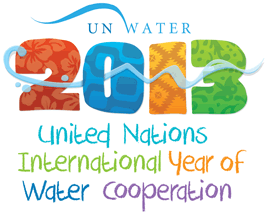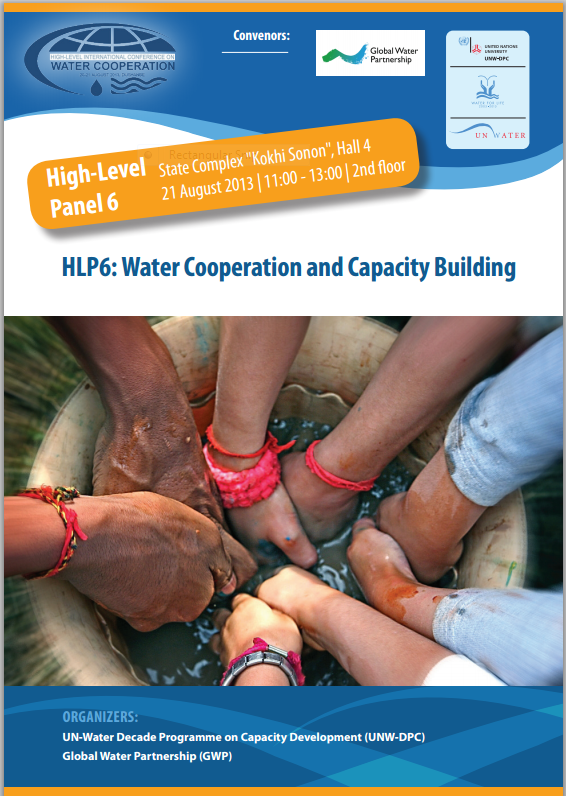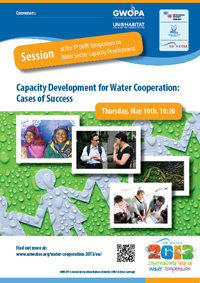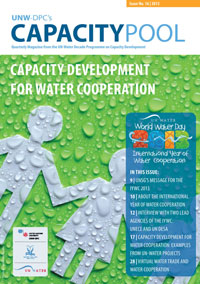
2013 is the United Nations International Year of Water Cooperation (IYWC). UN-Water has called upon the United Nations Educational, Scientific and Cultural Organisation (UNESCO) to lead the preparations of the 2013 IYWC in cooperation with the United Nations Economic Commission for Europe (UNECE) and the United Nations Department of Economic and Social Affairs (UN DESA), with active support from UNW-DPC. It is clear that water education and capacity development are vital for realizing the potentials in water cooperation, and several events throughout the Year will underscore this fact.
1 2013: United Nations International Year of Water Cooperation
 |
The objective of the International Year is to raise awareness, both on the potential for increased cooperation, and on the challenges facing water management in light of the increase in demand for water access, allocation and services. The Year will highlight the history of successful water cooperation initiatives, as well as identify burning issues on water education, water diplomacy, transboundary water management, financing cooperation, national/international legal frameworks, and the linkages with the Millennium Development Goals. It will also provide an opportunity to capitalize on the momentum created at the United Nations Conference on Sustainable Development (Rio+20) and support the formulation of new objectives that will contribute towards developing water resources that are truly sustainable.
More information at: Water-cooperation-2013.
|
2 Water Cooperation and Capacity BuildingHigh Level Panel on Water Cooperation and Capacity Building, Dushanbe Conference
Session: Aug 21st, 2013
 |
Participating Organizations:
Co-chairs: UN-Water, OSCE
Co-organizers: UNW-DPC, GWP
Moderator: Alex Gryzbowski (Pacific Resolutions)
Participating Organizations (Panel): UNU-INWEH, SDC, BPW International, UNW-DPC
Summary Report |
Capacity development is an essential stepping stone for water cooperation – this includes not only water-related capacity development at both the individual and institutional levels, but also the enabling environment is needed to implement good water governance.
Capacity development should allow for the participation of all target groups, including indigenous peoples, marginalized and other vulnerable groups, promoting gender equality, democracy and integrity. Given the particular role of local and regional authorities, their capacity to fulfill their responsibilities should be strengthened. Mechanism to enable exchange of best practices on water laws, regulations, standards and budgets should be supported. Both at the national and international level, effective water cooperation is often hampered by the lack of data on the quantity, distribution and quality of available water resources.
The availability of good quality data, both current and in sufficiently long time series, the presence of standards, and active data and information sharing are widely considered to be critical for effective water management. Its use, however, requires the presence of a certain capacity to use and apply that information to accurately inform decision-making.
Political and financial support from governments and the involvement of a variety of stakeholders contributes to the success of sustainable capacity development for water cooperation.
In addition, innovative, inclusive and sustainable financing mechanisms for water need to be implemented. A multi-disciplinary and integrated approach is essential to grasp the many facets of water cooperation cutting across a wide range of actors, disciplines and scales.
More information: Flyer 3 Session on Capacity Development for Water Cooperation
5th Delft Symposium on Water Sector Capacity Development
Session: May 30th, 2013
Moderator: Bert Diphoorn (UN-Habitat), Vice-Chair of UN-Water
Participating Organizations:
UNW-DPC, UN-Habitat, ESCAP, UNDP/Cap-Net, IGRAC, O�ffice Nationale de l’Eau et l’Electricite (Morocco)
 |
To realize the goals of Capacity Development for Water cooperation, a multi-disciplinary and integrated approach is essential to grasp the many facets of water cooperation cutting across a wide range of actors, disciplines and scales. However, implementing this approach has been challenging.
This session aims to present cases where efforts to strengthen knowledge and capacity have resulted in improved coordination in the water sector across multiple government institutions, civil society, the private sector and knowledge institutes.
More information is available at: unesco-ihe.org/CD-Symposium
|
Presentation:
Click below to view the Prezi given at the session on May 30th. This version is subject to updates and changes by the session organizers.
4 Background Materials
 |
UNW-DPC's has dedicated its 16th regular newsletter, the "Capacity Pool", to the topic of "Capacity Development for Water Cooperation." It includes an overview of several UN-Water capacity development initiatives and interviews with two of the official supporting agencies for the International Year of Water Cooperation. Check out the new e-magazine format here.
This newsletter, 16th in UNW-DPC’s regular series, provides an overview of the e-learning and capacity development activities of UNW-DPC and other UN-Water members and partners. Its topic include the following, among others:
- UNSG’s Message for the IYWC 2013 About the International Year of Water Cooperation
- Interview with two lead agencies of the IYWC: UNECE and UN DESA
- Capacity development for water cooperation: examples from UN-Water projects
- Virtual Water Trade and Water Cooperation
|
|
|
Link to the topic: Institutional Capacity Development in Transboundary Basins
|






